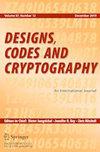Codes from $$A_m$$ -invariant polynomials
IF 1.2
2区 数学
Q3 COMPUTER SCIENCE, THEORY & METHODS
引用次数: 0
Abstract
Let q be a prime power. This paper provides a new class of linear codes that arises from the action of the alternating group on \({\mathbb {F}}_q[x_1,\dots ,x_m]\) combined with the ideas in Datta and Johnsen (Des Codes Cryptogr 91(3):747–761, 2023). Compared with Generalized Reed–Muller codes with analogous parameters, our codes have the same asymptotic relative distance but a better rate. Our results follow from combinations of Galois theoretical methods with Weil-type bounds for hypersurfaces.
代码来自$$A_m$$ -不变多项式
设q为质数幂。本文结合Datta和Johnsen (Des codes Cryptogr 91(3): 747-761, 2023)的思想,提出了由\({\mathbb {F}}_q[x_1,\dots ,x_m]\)上的交替群作用产生的一类新的线性码。与具有类似参数的广义Reed-Muller码相比,我们的码具有相同的渐近相对距离,但速率更高。我们的结果来自于伽罗瓦理论方法与超曲面的weil型界的结合。
本文章由计算机程序翻译,如有差异,请以英文原文为准。
求助全文
约1分钟内获得全文
求助全文
来源期刊

Designs, Codes and Cryptography
工程技术-计算机:理论方法
CiteScore
2.80
自引率
12.50%
发文量
157
审稿时长
16.5 months
期刊介绍:
Designs, Codes and Cryptography is an archival peer-reviewed technical journal publishing original research papers in the designated areas. There is a great deal of activity in design theory, coding theory and cryptography, including a substantial amount of research which brings together more than one of the subjects. While many journals exist for each of the individual areas, few encourage the interaction of the disciplines.
The journal was founded to meet the needs of mathematicians, engineers and computer scientists working in these areas, whose interests extend beyond the bounds of any one of the individual disciplines. The journal provides a forum for high quality research in its three areas, with papers touching more than one of the areas especially welcome.
The journal also considers high quality submissions in the closely related areas of finite fields and finite geometries, which provide important tools for both the construction and the actual application of designs, codes and cryptographic systems. In particular, it includes (mostly theoretical) papers on computational aspects of finite fields. It also considers topics in sequence design, which frequently admit equivalent formulations in the journal’s main areas.
Designs, Codes and Cryptography is mathematically oriented, emphasizing the algebraic and geometric aspects of the areas it covers. The journal considers high quality papers of both a theoretical and a practical nature, provided they contain a substantial amount of mathematics.
 求助内容:
求助内容: 应助结果提醒方式:
应助结果提醒方式:


